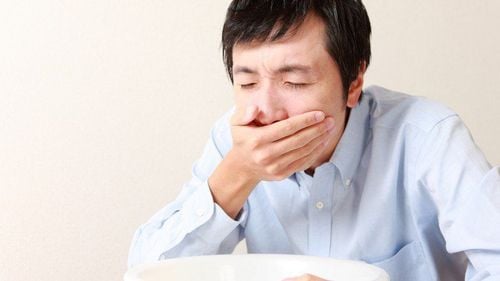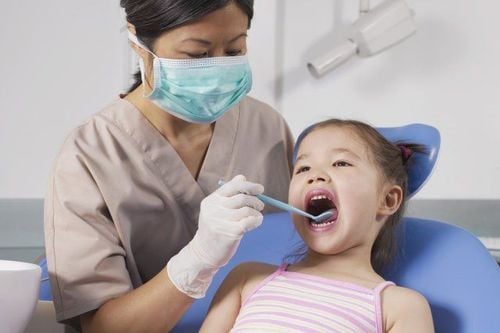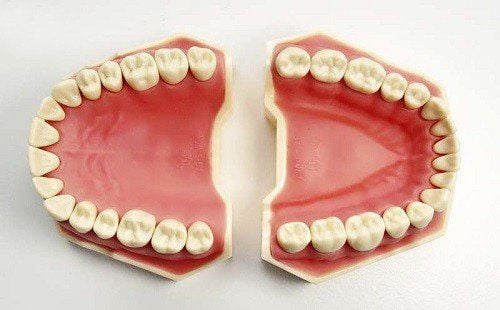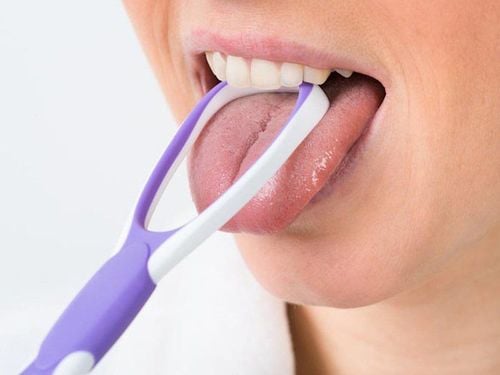This is an automatically translated article.
Bad breath is caused by many different causes, which are mainly caused by bacteria accumulation, dental diseases, respiratory and digestive diseases. The general solution for bad breath is good oral hygiene, treatment of related diseases, drinking plenty of water and limiting foods with odors.
1. Bad breath, causes and solutions?
1.1. Bad breath is caused by bacteria Bad breath is caused by bacteria that grow in the mouth, which hide between the teeth and tongue. Once trapped there, they begin to proliferate and give off a stench.
Brushing and flossing are considered effective measures recommended by doctors. Brushing teeth and tongue twice a day for at least 2 minutes, combined with flossing once a day helps reduce bad breath. You should note, should use toothpaste containing fluoride and tongue scraper to effectively remove bacteria.
1.2. Bad breath due to tonsil stones Tonsil stones are formed when bacteria multiply in small holes and sacs in the tonsils, gradually creating hard white patches, the size of small stones. These tonsil stones have a foul odor, causing bad breath and discomfort in the mouth.
Flossing can remove debris before they harden like a stone. Alternatively, using a cotton swab or even a toothbrush can help remove tonsil stones. Prevent the formation of tonsil stones by gargling with warm water, for people who often have tonsillitis and tonsil stones, the best way is to have tonsils surgically removed.
1.3. Bad breath due to stomach disease Abdominal bloating or stomach diseases such as gastroesophageal reflux disease, stomach ulcers can cause bad breath when belching.
Using over-the-counter antacids or acid blockers can help calm acid reflux. If you are lactose intolerant and have stomach problems, try lactase tablets. Additionally, eating yogurt or taking probiotics can help boost beneficial bacteria in the gut, which can reduce the risk of bad breath.
1.4. Bad breath caused by eating smelly foods Smelly foods like onions, garlic and some spices can cause bad breath, even after cleaning, bad breath is still caused by smelly foods entering the body. When they're broken down, smelly chemicals travel through your bloodstream to your lungs, and create a foul odor when you exhale.
Brushing, flossing and rinsing will clear hidden food debris and prevent odor-causing bacteria from multiplying. If that doesn't work, limit your intake of garlic and onions or don't eat them unless they're cooked.
1.5. Bad breath due to sinusitis Sinusitis can be another cause of bad breath. Treat a stuffy nose and postnasal drip with saline sprays, allergy treatments, rehydration, or steroid nasal sprays.
Antibiotics are also suggested for chronic bacterial sinusitis. Viral sinus problems should not be treated with antibiotics. If your child has bad breath and a runny nose on one side, take him or her to the doctor to check for a foreign body in the nose.

Người mắc bệnh lý viêm xoang có thể khiến hơi thở có mùi
1.6. Bad breath due to lack of saliva Dry mouth can cause bad breath due to lack of saliva. Saliva exists not only to digest food, but also to clean debris and bacteria from the mouth. There are many causes of dry mouth such as too much caffeine, stuffy nose breathing, antihistamines, even a rare disease called Sjogren's syndrome.
Drink water and spit to remove odor-causing bacteria from the mouth. Also, try to keep your mouth moist by staying hydrated and chewing gum. If you have a stuffy nose, it's important to treat it as prescribed by your doctor and consider using artificial saliva products.
1.7. Bad breath caused by dental disease Tooth decay and gingivitis can cause bad breath. Regular brushing, flossing, fluoride mouthwash and dental check-ups every 6 months. Note, avoid using mouthwash containing alcohol because it can cause dry mouth.
1.8. Bad breath caused by smoking Smoking causes bad breath and gum diseases due to the toxic substances that cause odor in it. Stopping tobacco use, maintaining good oral hygiene by brushing, flossing, rinsing, drinking plenty of water, and chewing gum can provide quick relief from bad breath.
1.9. Bad breath due to chronic illness Chronic conditions such as chronic bronchitis, diabetes, kidney or liver disease can cause bad breath.
Treatment to improve disease status and bad breath associated with acquired chronic disease. Seek medical attention immediately if bad breath increases, as it could be a sign of a worsening condition.
Watch now: Bad breath due to reflux of gastric juice
2. Why does lazy oral hygiene cause bad breath?
Without brushing and flossing daily, food particles left in the mouth can become a favorable environment for bacteria to grow. Especially in the interdental spaces, around the gums and on the tongue, causing bad breath and causing oral diseases such as gingivitis and tooth decay.
Dentures that are not cleaned properly can also create conditions for odor-causing bacteria and food particles to stick to cause bad breath. Smoking not only causes bad breath, but also stains teeth, reduces taste and increases gum irritation.

Lười vệ sinh răng miện có thể khiến hơi thở có mùi
3. Bad breath is a sign of dental disease?
Persistent bad breath can be a warning sign of gum (periodontal) disease, a buildup of plaque that allows bacteria to produce toxins that irritate the gums. If the disease is not treated, it can cause damage to the gums and jawbone.
Dry mouth is also a cause of bad breath, due to too little saliva production, not enough to moisten the mouth, neutralize acids from plaque and remove dead cells that accumulate on the tongue, gums and cheeks. Dry mouth can be caused by medication side effects, problems with your salivary glands, problems that cause you to constantly breathe through your mouth.
Some other diseases can also cause bad breath such as:
Oral infections Tooth decay Seasonal allergies Respiratory tract infections such as pneumonia, bronchitis Chronic sinusitis Post-nasal drip Diabetes Chronic acid reflux Gastrointestinal problems Chronic pneumonia Liver or kidney problems There are many causes of bad breath and can also be a warning sign of an underlying medical condition. Therefore, if bad breath persists, you should go to specialized clinics and hospitals for examination and treatment.
With many years of experience in the examination and treatment of oral and maxillofacial diseases, now Vinmec International General Hospital has become one of the major health care centers, capable of examining and screening filtering and treating many diseases in depth. Therefore, if there are signs of prolonged breath that does not improve, you can go to Vinmec International General Hospital to examine and receive support and advice from doctors and health experts. .
Please dial HOTLINE for more information or register for an appointment HERE. Download MyVinmec app to make appointments faster and to manage your bookings easily.
References: webmd.com, mayoclinic.org, medicalnewstoday.com












